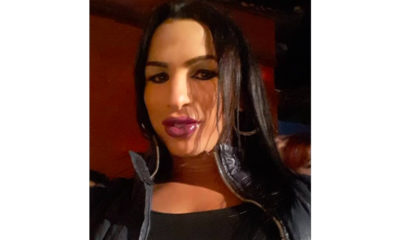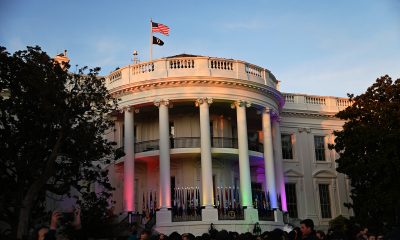News
Cuba’s LGBTQ community is living a week of celebrations and controversy
May 11 marked a year since an independent march took place in Havana
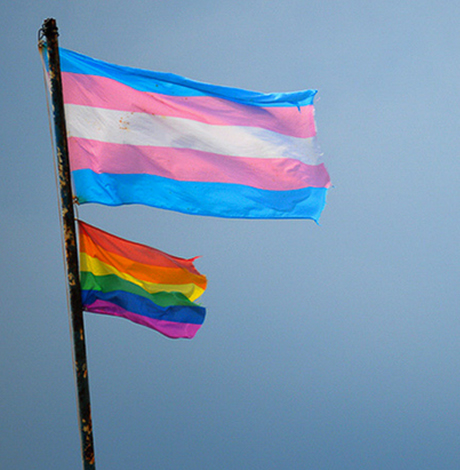
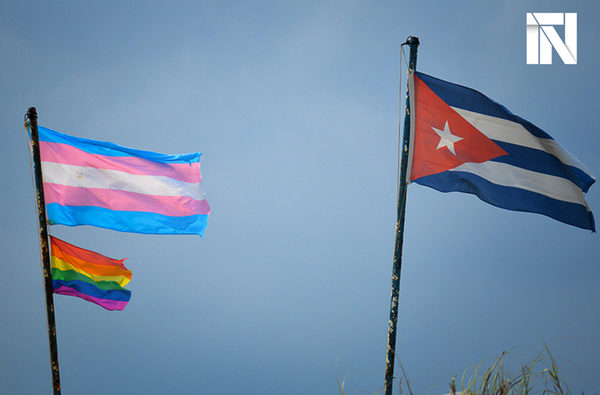
Editor’s note: Tremenda Nota is the Los Angeles Blade’s media partner in Cuba. Tremenda Nota published this article on their website on May 20.
HAVANA — This past Monday the LGBTI+ community celebrated the first anniversary of the march of May 11, 2019, when several hundred people demonstrated in Havana. This protest followed the cancellation of an official event for the LGBTI+ community that had taken place every year for a decade.
The independent march was also inspired by the previous year’s debates about Article 68, a proposed revision to the Cuban Constitution that would have allowed marriage equality. Article 68 was suppressed in the new Constitution’s final revision, which was submitted to popular referendum in February 2019, creating tension between the community and the Cuban government.
The government responded to the May 11 march with violence, dispersing the crowd with dozens of policemen who arrested activists and other participants. It also discredited the event in official state-run media.
This police violence drew parallels with incidents such as Stonewall, an iconic moment for the international LGBTI+ movement, and caused May 11 to be considered by some activists as the Day of the LGBTIQ Cuban Movement.
Taking this perspective, the Miami-based influencer Alex Otaola celebrated the anniversary with an online forum on Monday morning. Otaola is known for his show “Hola Ota-Ola”, where he has promoted controversial campaigns against artists who publicly sympathize with the Cuban government.
That afternoon, independent LGBTI+ activists who work in Cuba — that is, those unaffiliated with the Cuban government — held their own virtual forum. The forum was broadcast on Facebook after a hacking attack reportedly disabled the website originally planned to host it, according to complaints the organizers shared by social media.
The activist Jancel Moreno told Tremenda Nota, “At about 9 a.m., I could no longer access my page ‘Give Me Your Hand.’ After I complained publicly about this, my mobile data connection completely disappeared.”
The forum organized from Havana began hours late because of the hacking, which Moreno denounced.
The majority of the forum’s panelists were activists who participated in the march of May 11th and analyzed the LGBTI+ community’s challenges, including the upcoming debate about revising the Cuban Family Code. This revision represents the country’s best chance to legalize marriage equality, among other rights and protections for LGBTI+ Cubans and their families.
They also related their experiences of May 11 and spoke about its historical significance.
For example, the poet and critic Norge Espinosa Mendoza described the independent march as “a turning point in the history of the relationship between political powers and diverse sexualities in Cuba, a history that’s densely packed, fragmented, and very complex.” Espinosa was among the activists who first waved a rainbow flag at a public event in Cuba more than 20 years ago.
“What happened on May 11th can definitely be understood as a phenomenon that gave voice and visibility to other needs of Cuban society beyond sexuality,” he said.
Activists disagree with the boycott of CENESEX workers
Above-mentioned influencer Alex Otaola is a South Florida-based opinion leader of the Cuban exile community. He said this Monday that the Cuban LGBTI+ movement is “divided” because many of those who drove the march of May 11, 2019, refused to participate in the special anniversary program he hosted from Miami.
“There’s a group that participated in that march but didn’t want to celebrate with us today because they think … that I’m a very politicized figure and that it won’t be the kind of homage the event deserves.”
The activist Ulises Padrón mentioned Otaola’s program in a Facebook post, where he said that “his histrionic approach to politics, his oversimplified arguments, and his incitement of hate keep him from presenting a more heterogeneous picture of Cuba.”
But Victor Manuel Dueñas, a supporter of Otaola’s virtual event, and Yosmany Mayeta Labrada, an exile activist in Washington, believe that some participants in the 2019 march represent an activism “built in the Obama era specifically with the objective of creating a vision of opening, a vision of independence for the LGBT movement.”
Durung the virtual event, Dueñas launched a petition asking the U.S. government to cancel visas and financing to employees of Cuba’s National Center of Sexual Education (CENESEX), who are referred to in the text as “ex-government officials.”
Cenesex, led by Mariela Castro, the daughter of Raúl Castro and niece of Fidel Castro, is an official state agency whose social mission includes assuming the leadership of LGBTI+ activism in Cuba.
Dueñas’ petition denounces recent statements in which Mariela Castro spoke about the forced labor camps established by the Cuban government in the 1960s. People considered a threat to Cuba’s revolutionary society were sent away to the camps, including political dissidents and homosexual men. Castro’s statements minimized the human rights violations reported to have taken place at these camps.
The petition argues that, based on these recent statements by Mariela Castro and other reasons not fully explained, the U.S. State Department should prohibit a dozen people involved with CENESEX from entering the U.S. to prevent “the financing of the National Center of Sexual Education by institutions and individuals in U.S. territory.”
At time this article was published, the petition has more than 4,000 signatories on change.org, a platform that cannot be accessed from Cuba.
Yosmany Mayeta Labrada, one of the petition’s authors, told Tremenda Nota that Mariela Castro is already prohibited from entering the U.S., but that “she can send some of those who are mentioned in the petition” in order to “raise funds for her agency.”
Mayeta was unable to confirm for Tremenda Nota whether in fact CENESEX currently receives any funds sent from the U.S.
Tremenda Nota inquired about this point with Manuel Vázquez Seijido, one of the government officials named in the petition to the State Department.
Seijido, deputy director of CENESEX, said that the agency will not issue any statements about alleged funding from the U.S. and that there was “no news” in the petition by the exile activist community.
Some independent activists who have worked with CENESEX or have accessed its services made statements on their social networks about the petition.
“Yesterday Otaola tried to draw all the attention around [May 11] to himself. During his show, apart from hosting guests who all share a single political position (it should have been more diverse), he made statements and petitions far from the program’s stated purpose,” said Ulises Padrón referring to the petition promoted on Monday.
Padrón opined that “to disallow the activities of [CENESEX] and the activism it promotes represents an infantile, dangerously ideological attitude.”
Mel Herrera, a transsexual woman who collaborates with the independent publication “Q de Cuir” (“Q as in Queer”), said on Facebook that “thanks to CENESEX, I’ve been able to realize many of the goals I had for myself, and this has helped me stay away from the possibility of suicide.”
She emphatically stated, “Don’t count on me for this boycott.”
Features
New mayor Chelsea Byers, hopes to make WeHo a model city for others to follow
She has big plans, but can they withstand the Trump administration?

West Hollywood’s new mayor Chelsea Byers has lofty ambitions to make the 1.8-square-mile city, a model for other cities in the region.
She hopes to deal with compounding crises of housing affordability, traffic congestion, climate change and a new federal government that’s slashing programs and services many people – especially LGBTQ people – rely on.
But can Byers, who was elected to city council in November 2022 and selected as
mayor by council in January, really make a difference during her one-year stint in the
city’s top job?
Byers believe she can.
On one of the biggest challenges facing West Hollywood residents – housing
affordability – Byers fully embraces more housing development.
“For 80% of the city of West Hollywood including myself, who are renters, accessing a
home that is affordable is a very difficult thing. And the way that cities can address that
cost is frankly, by building more housing,” said Byers.
Byers also says she fully accepts the state’s regional housing needs assessment, which
assigned West Hollywood a target of building 3,933 new housing units in the next eight
years. That’s a tall order, given the city is currently only home to about 38,000 people.
“We’re going to have to look at this sort of invisible cap that we put across the town to
increase the capacity in a way that is equitable, that creates more opportunity for
different types of housing to be built. We wouldn’t want all of this rezoning to help us
lead to more one-bedroom apartments, when we know that the future of the city is also
accommodating more families,” said Byers, noting that queer families also struggle to find
homes in West Hollywood.
Those housing targets also dovetail with the city’s long-standing ambition to have
Metro’s K-Line extended through West Hollywood, Byers says.
But even if West Hollywood meets its targets, it’ll only be a small drop in region that
studies estimate needs to build more than 600,000 units of affordable housing. Still,
Byers says West Hollywood can lead by example and get buy-in from the other cities in
LA County to help solve the affordability crisis together.
“I believe that our values can be extended to these other places and help move them
actually in big ways,” said Byers.
Those values necessarily include West Hollywood’s historic diversity and inclusivity of
its LGBTQ+ and immigrant communities, both of which are feeling ill at ease from the
federal government’s attacks.
“I think it goes above and beyond the fear-mongering and outright assaults that the
current federal administration’s lobbying at the LGBTQ community. It’s the real
dismantling of funding and structures that existed at the federal level to enable a lot of
the social service programming that our LGBTQ community members rely on,” said Byers. “That is the biggest thing that we feel right now when I’m asked as a city leader,
how are we impacted?”
The city is responding to this looming threat through its own funding process.
“We’re at the start of a three-year cycle that determines how, which organizations, we
invest our $7.8 million social service budget. To have these two moments happening at
the same time gives the city a tremendous opportunity to step up to whatever extent we
can,” she said, noting that programs for sexual health care, HIV programs, and aging
in place are particular priorities.
“Part of what I’m doing is creating funding that is accessible and available in more rapid
ways than our three-year cycle. Because once the three-year cycle has closed its door,
then that is it. One of those tools is a micro grant program that is specifically dedicated
towards Innovative or programming that that is needed,” Byers said.
Part of the response is also ensuring that West Hollywood remains a beacon for LGBTQ
people not just in Los Angeles, but across the country and around the world.
“You’ll see us as the city not back down from our investment in programs like Pride
which are world-class events,” she said. “For us, this is the thing that matters. And
we’re willing to make the additional investments in the public safety resources to make
sure that it’s going to be a safe event.
“I think a lot of our community members have always felt like they are a target already,
and it hasn’t stopped anyone from doing their thing. In fact, if all eyes are watching, then
we better give them a good show, has been our attitude.”
Earlier this month, city council voted to officially designate the Santa Monica strip
between La Cienega and Doheny as the Rainbow District, with a dedicated budget to
improve and promote the area as a destination. The area will soon see new street pole, banners, utility wraps, murals, and the West Hollywood Trolley bus will have service
extended to Thursday nights to help promote business along the strip.
Byers says the city is also looking at reducing red tape around how business spaces are
licensed to help revitalize the area.
“We’ve often said that West Hollywood is a model for how it gets done,” said Byers. “It’s
such a beautiful moment for us to sort of pivot our focus locally and remind ourselves
that cities are about quality of life, and making sure that we can be an inclusive city.”
Congress
EXCLUSIVE: Garcia demands answers on deportation of gay Venezuelan asylum seeker
Congressman’s correspondence was shared exclusively with the Blade

U.S. Rep. Robert Garcia (D-Calif.) is demanding answers from the Trump-Vance administration on its deportation of Andry Hernández Romero, a gay Venezuelan makeup artist who was sent to a prison in El Salvador in violation of a federal court order and in the absence of credible evidence supporting the government’s claims about his affiliation with a criminal gang.
Copies of letters the congressman issued on Thursday to Immigration and Customs Enforcement and CoreCivic, a private prison contractor, were shared exclusively with the Los Angeles Blade.
Garcia noted that Hernández, who sought asylum from persecution in Venezuela over his sexual orientation and political beliefs, had entered the U.S. legally, passed a preliminary screening, and had no criminal record.
Pro-bono lawyers representing Hernández during his detention in the U.S. pending an outcome in his asylum case were informed that their client had been removed to El Salvador a week after he failed to show for a hearing on March 13.
Hernández’s family now fears for his safety while he remains in El Salvador’s Terrorism Confinement Center (CECOT), which has a well documented record of human rights abuses, Garcia said.
Additionally, the congressman wrote, while experts say Tren de Aragua does not use tattoos as identifiers, the “primary evidence” supporting Hernández’s deportation based on his supposed links to the transnational Venezuelan gang “appears to have been two crown tattoos labeled ‘Mom’ and ‘Dad,’ which are common cultural symbols in his hometown.”
The determination about his links to or membership in the organization was made by a CoreCivic employee whose criminal record and misconduct as a law enforcement officer led to his termination from the Milwaukee Police Department, Garcia wrote in his letter to the company.
Requesting a response by May 1, the congressman asked CoreCivic President Damon T. Hininger to address the following questions:
- What qualifications and training does CoreCivic require for employees tasked with making determinations about detainees’ affiliations?
- What protocols are in place to ensure that determinations of gang affiliation are based on credible and corroborated evidence?
- How does CoreCivic oversee and review the decisions made by its employees in such critical matters?
- What mechanisms exist to prevent and address potential misconduct?
- What is the nature of CoreCivic’s collaboration with ICE in making determinations that affect deportation decisions? Are there joint review processes?
- What background checks and ongoing assessments are conducted for employees involved in detainee evaluations, particularly those with prior law enforcement experience?
- What guidelines does CoreCivic follow regarding the use of tattoos as indicators of gang affiliation, and how does the company ensure that cultural or personal tattoos are not misinterpreted?
In his letter to Tae D. Johnson, acting director of ICE, Garcia requested answers to the following questions by May 1:
- Did ICE personnel independently review and approve the determination made by CoreCivic employee Charles Cross Jr. identifying Mr. Hernández Romero as a member of the Tren de Aragua gang?
- What evidence, beyond Mr. Hernández Romero’s tattoos, was used to substantiate the claim of gang affiliation?
- Under what legal authority are private contractors like CoreCivic permitted to make determinations that directly impact deportation decisions?
- What vetting processes and background checks are in place for contractors involved in such determinations? Are there oversight mechanisms to ensure their credibility and adherence to due process?
- What guidelines does ICE follow regarding the use of tattoos as indicators of gang affiliation, and how does the company ensure that cultural or personal tattoos are not misinterpreted?
Together with U.S. Rep. Maxwell Frost (D-Fla.), Garcia wrote to U.S. Rep. James Comer (R-Ky.) on Tuesday requesting permission to bring a congressional delegation to CECOT for purposes of conducting a welfare check on detainees, expressing specific concern for Hernández’s wellbeing. The congressmen said they would “gladly include any Republican Members of the committee who wish to participate.”
Hernández’s case has drawn fierce criticism of the Trump-Vance administration along with calls for his return to the U.S.
Influential podcaster and Trump ally Joe Rogan spoke out in late March, calling the deportation “horrific” and “a horrible mistake.”
Last week, California Gov. Gavin Newsom (D) sent a letter to Kristi Noem, secretary of the U.S. Homeland Security, which manages ICE, demanding Hernández’s immediate return and raising concerns with the right to due process amid the administration’s crackdown on illegal immigration.
Hernández “was denied the opportunity to defend himself against unsubstantiated allegations of gang involvement or to present his asylum claim,” the governor wrote. “We are not a nation that sends people to be tortured and victimized in a foreign prison for public relations victories.”
Immigrant Defenders Law Center President Lindsay Toczylowski, who is representing Hernández, has not been able to reach her client since his removal from the U.S., she told NBC News San Diego in a report published April 11.
“Under the Constitution, every single person has a right to due process, and that means they have a right to notification of any allegations the government is making against them and a right to go into court and prove that those allegations are wrong if that’s the case,” she said. “In Andry’s case, the government never gave us that opportunity. In fact, they didn’t even bring him to court, and they have forcefully sent him to El Salvador without ever giving us any notice or without telling us the way that we could appeal their decision.”
“CECOT, this prison where no one has ever left, where people are held incommunicado, is a very dangerous place for someone like Andry,” Toczylowski said.
In March, a DHS spokesperson posted on X that Hernández’s “own social media indicates he is a member of Tren de Aragua,” though they did not point to any specific posts and NBC reported that reviews of his known social media accounts turned up no evidence of gang activity.
During a visit to CECOT in March, Time Magazine photographer Philip Holsinger photographed Romero and reported that the detainee plead his innocence — “I’m not a gang member. I’m gay. I’m a stylist.” — crying for his mother as he was slapped and his head was shaved.
Brazil
US lists transgender Brazilian congresswoman’s gender as ‘male’ on visa
Erika Hilton has represented São Paulo since 2022

A transgender Brazilian congresswoman says the U.S. issued her a visa that listed her gender as “male.”
Erika Hilton on Wednesday wrote on her Instagram page that she requested a visa that would have allowed her to travel to the U.S. in order to participate in the Brazil Conference at Harvard University and the Massachusetts Institute of Technology.
The conference took place earlier this month.
“I was classified as ‘male’ by the U.S. government when I went to get my visa,” wrote Hilton, who added a visa she received from the U.S. in 2023 listed her gender as “female.”
Hilton is a Black travesti and former sex worker from São Paulo who won a seat in the Brazilian Congress in 2022. The Washington Blade spoke with Hilton shortly after her election.
“It is a big responsibility … but I feel very honored,” said Hilton. “I very much like to be able to be a representative for my people, and the more than 250,000 people who voted for me have confidence in me,” she said after she spoke at a rally in support of now Brazilian President Luiz Inácio Lula da Silva in a São Paulo square. “This demonstrates that our work has the potential to have a gigantic reach; where we can advance efforts to end death, poverty, misery, genocide that we have.”
President Donald Trump in his inaugural speech announced the federal government’s “official policy” is “there are only two genders, male and female.” The Trump-Vance administration has also banned the State Department from issuing passports with “X” gender markers.
Germany and Denmark are among the countries that have issued travel advisories for trans and nonbinary people who plan to visit the U.S. These warnings come ahead of WorldPride, which is scheduled to take place in D.C. from May 17-June 8.
Hilton said she is “not surprised” the U.S. issued her a visa with a male gender marker.
“I’m also not surprised by the level of hatred and fixation these people have with trans people,” she said. “After all, the documents I presented are rectified, and I’m registered as a woman, even on my birth certificate.”
Hilton further accused the U.S. of “ignoring official documents from other sovereign nations, even from a diplomatic representative.”
“At the end of the day, I’m a Brazilian citizen, and my rights are guaranteed and my existence is respected by our own constitution, legislation, and jurisprudence,” she said.
Editor’s note: Duda Salabert, another transgender Brazilian congresswoman, also said the U.S. listed her gender as “male” on her American visa.
National
Discredited former cop played ‘key role’ in deportation of gay make-up artist
Former police officer claimed that Andry Hernandez Romero was a member of Venezuelan gang ‘Tren de Aragua’

A new investigation points to a discredited, former police officer who played a “key role” in the wrongful deportation of Andry Hernández Romero, a gay asylum seeker and make-up artist who was sent to a prison in El Salvador under Trump’s Alien Enemies Act.
USA Today found in a recent investigation that the former Milwaukee police officer who filed the report about Hernández Romero, citing his tattoos as the reason for the alleged gang affiliation, has a long history of credibility and disciplinary issues in his former police officer position.
The private prison employee who previously worked as a police officer until he was fired for driving into a house while intoxicated—among other alcohol-related incidents—“helped seal the fate,” of Hernández Romero.
The investigation by USA Today found that the former police officer accused Hernández Romero of being a part of the Tren de Aragua gang because of Romero’s two crown tattoos with the words “mom,” and “dad,” which are now being identified as Venezuelan gang-related symbols.
Since then, his story has made headlines across the nation because Hernández Romero not only has no criminal record, but is legally seeking asylum in the U.S. due to credible threats of violence against him in Venezuela because of LGBTQ persecution.
He was targeted shortly after Trump invoked the Alien Enemies Act of 1798, which is a proclamation for all law enforcement officials to “apprehend, restrain, secure and remove every Alien Enemy described in section 1 of [the] proclamation.”
Charles Cross Jr., the former police officer, signed the report that wrongfully identified Hernández Romero as a gang member. Cross was fired in 2012 after many incidents relating to his credibility and how it was affecting the credibility of the Milwaukee Police Department to testify in court.
He had already been under investigation previously for claiming overtime pay that he never earned. In 2007, he had faced criminal charges for damage to property, according to court records.
In March, The Washington Blade spoke with the Immigrant Defenders Law Center Litigation and Advocacy Director Alvaro M. Huerta regarding the case who stated that “officials with U.S. Immigration and Customs Enforcement and U.S. Customs and Border Protection alleged his organization’s client was a member of Tren de Aragua, a Venezuela-based gang, because of his tattoos and no other information.”
Hernandez Romero came to the United States last year in search of asylum and now makes up one of 238 Venezuelan immigrants who were deported from the U.S. to El Salvador, Honduras and Venezuela. Many of those being deported are being sent to the Center for Terrorism Confinement, a maximum-security mega-prison in El Salvador, which has been accused of human rights violations.
According to the investigation, the Department of Homeland Security “wouldn’t offer further details on the case, or the process in general, but reiterated that the department uses more than just tattoos to determine gang allegiance.”
His story is now being looked at as a cautionary tale for the lack of due process the U.S. government is taking, as the Department of Homeland Security (DHS) and Immigration and Customs Enforcement (ICE) ramp up deportations across the nation.
Organizations like the Human Rights Campaign are now calling for Secretary of State Marco Rubio and Secretary of Homeland Security Kristi Noem to cease wrongful deportations and return Hernández Romero home. The petition also urges the U.S. government to afford all Americans, including nationals and asylum seekers residing in the U.S., due process of law as required by the Constitution.
California
South Park provides green space to a predominantly Latino community
‘…the need for green spaces within Latino communities has never been greater, especially in South L.A.

South Park, one of the oldest parks in Historic South Central, has brought multi-generational Angelenos together for centuries.
The park sits at the intersection of 51st Street and Avalon Blvd, surrounded by some of the most socially, culturally and historically important locations in the country, including Central Avenue, site of the West Coast jazz scene in in the 30s and 40s, the former Black Panther Party headquarters in L.A and one of the epicenters of the Watts rebellion in 1965.
The park—also known as Barry White Park—was founded in 1899. Today, 126 years later, the park still stands—hosting weekend soccer games, señoras chismeando, recreational activities like swimming, card games among elders and city-led events.
The park was named after two-time Grammy Award winner and R&B singer Barry White, who grew up in South Central, just blocks away from the park.
As PBS initially reported, the City of Los Angeles purchased it from a private developer for $10,000. At that time it was not as big as it is now, but was always characterized by its tall palm trees.
The park is located in Los Angeles City Council District 9, where the population is predominantly Latino (79.9%). According to Park Equity, Life Expectancy and Power Building research, the need for green spaces within Latino communities has never been greater, especially in South L.A, where the landscape is often characterized by an overconcentration of liquor stores and a lack of quality and accessible recreational spaces. More than a century after the park’s opening, for many local residents, it is one of the only parks within walking distance for them.
Amanda Walker, 56, moved to L.A. from Chicago, Illinois. She said one of her favorite things to do at the park is to take in the sun.
“The sun falls perfectly anywhere through the park, that’s probably my favorite part,” Walker said.
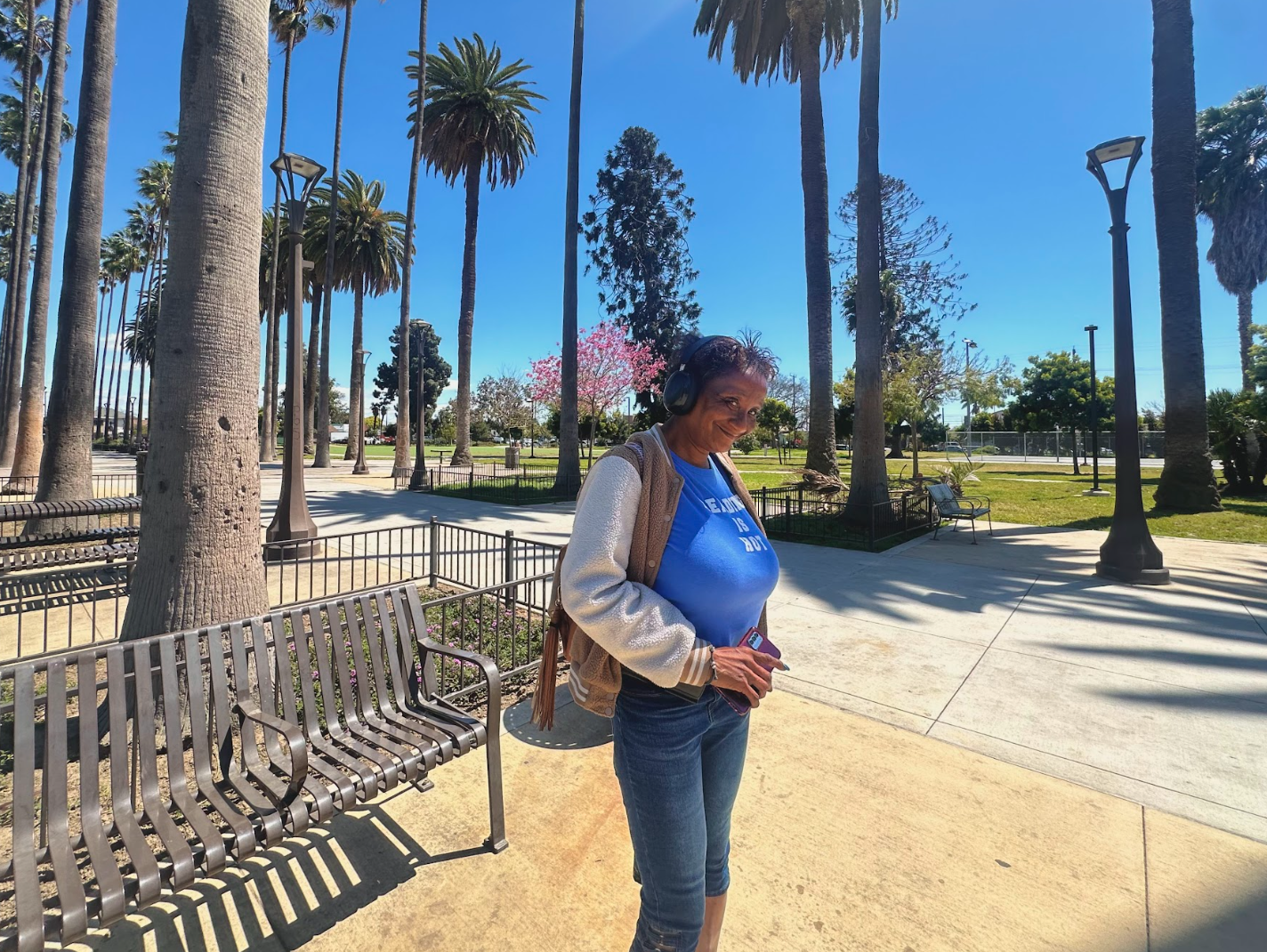
Amanda Walker at the park before meeting up with her friends. (Photo by Brenda Verano)
Walker said she loves coming to the park with her friends, who often use the park as a gathering place.
“I do wish there were more activities for adults,” she said. “The park has a playground for kids, and basketball courts… we need more things in the park for people like me.”
Maria L., 30, said she also comes to the park to be surrounded by nature. Although she lives in South Central, she said she does not have much free time to come as often as she would like.
“I haven’t been here in about eight months,” she said. Although she was alone, she was on a video call with her family where she was able to show them the scenery of the park and said she was surprised at how green and vibrant it all looked.
“I like coming here to just sit and hang out,” she said. She enjoys the sense of community she feels when being in the park. “Some people are walking their dogs; others are exercising or simply just laying down. It’s nice. I also like seeing the birds and the squirrels,” she said.
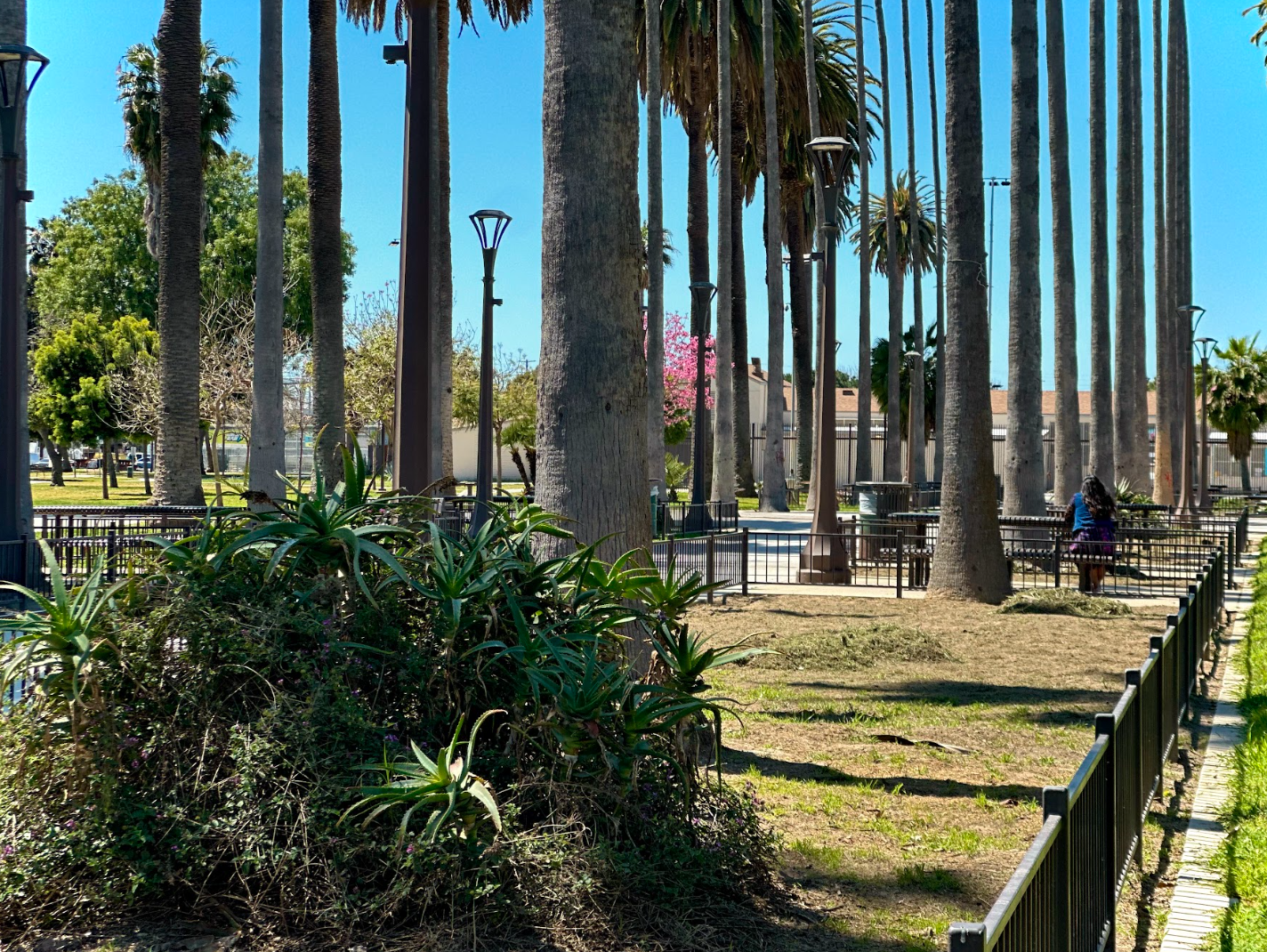
From a distance, Maria L. sits in the sun on the park benches. (Photo by Brenda Verano)
The relationship between access to parks and life expectancy are closely linked. Park deserts can have disastrous effects on residents as well as wildlife, as stated by a study conducted by the Prevention Institute in partnership with University of California, Los Angeles , the National Health Foundation, Community Coalition, Esperanza Community Housing Corporation and the Social Justice Learning Institute.
According to the research, South Central L.A. is considered to have “high park need” and “very high park need” neighborhoods, with an average of 1.6 and 0.7 acres of parkland per 1,000 residents, in comparison to the L.A. countywide average, which is 3.3 acres of parkland per 1,000 residents. The median life expectancy in South L.A. is 77 years, well below the level for the county as a whole. About 15 miles away, in the community of Beverly Hills, the life expectancy is about 90 years, 13 years higher.
South Central residents have been asking for more investment in parks and recreational facilities. In 2018, the 18.25-acre park went through a multi-million renovation, which allocated funding for the improvement of its gym, swimming pool, basketball and tennis courts, baseball diamond, outdoor stage, fitness area, picnic tables and children’s play area.
Despite the recent investments, the park has also been widely known for its gang and chrome activity, which the community says has been a direct effect of years of disinvestment and neglect.
In previous years, the Los Angeles Police Department identified the park as an area where gang activity—specifically from the Avalon Gangster Crips, Broadway Gangster Crips and 52nd Street Playboys—has been observed.
“The problem was scanned and revealed that this park, like many others in urban America, had slowly been neglected and overrun by criminal activity that revolved around gangs, narcotics and quality of life issues,” states the LAPD. “The analysis of the problem at the park was conducted by reviewing data, meeting with officers and receiving input from local community representatives and park staff members.”
Despite this, the community recognized the park as a long-standing historical entity of South Central L.A.
As one of the oldest parks in the city, South L.A. Park continues to be home to local residents, wildlife, street vendors, youth and all the great things that make up Los Angeles.
EDITORS NOTE: This article was published through the Bezos Fellowship grant provided by the Ethnic Media Services, which recently changed its name to American Community Media. The article was written by Brenda Fernanda Verano, an award-winning journalist who reports for CALÓ News, a local non-profit newsroom focusing on the Latin American community of Los Angeles.
Myanmar
LGBTQ+ advocacy group joins Myanmar earthquake relief effort
March 28 quake killed thousands, devastated country’s second-largest city

A powerful earthquake that rocked Myanmar on March 28 unleashed devastation across the central part of the country.
The U.S. Geological Survey measured the quake at 7.7, and pinpointing its epicenter roughly 10 miles west of Mandalay, the country’s second-largest city. A 6.4-magnitude aftershock jolted the area 12 minutes later, compounding the destruction and deepening the crisis for a nation already strained by conflict.
The earthquake struck with terrifying intensity near its epicenter, wreaking havoc on Mandalay and the nearby city of Sagaing.
Mandalay, a bustling city of approximately 1.5 million residents, bore the brunt of the destruction. Among the most striking losses was the 12-story Sky Villa Condominium, which collapsed, leaving scores trapped beneath the wreckage. Rescue workers scrambled to pull survivors from the rubble, but the rising death toll underscored the tragedy’s magnitude.
In Sagaing, which is located closer to the epicenter, more than 70 percent of buildings sustained damage. The Ava Bridge, an essential artery spanning the Irrawaddy River, collapsed, cutting off a critical connection to Mandalay. The earthquake’s shallow depth of less than seven miles amplified its power, reducing homes, temples, and schools to rubble.
The earthquake’s death toll continues to climb, with at least 3,649 confirmed dead, more than 5,000 injured, and approximately 145 people missing. Amid the widespread devastation, questions loom about the impact on vulnerable populations. The Los Angeles Blade reached out to Colors Rainbow, an organization advocating for LGBTQ+ rights in Myanmar, to understand how the crisis has affected one of the nation’s most marginalized communities.
Colors Rainbow Executive Director Hla Myat Tun spoke about how his organization is working to address the crisis faced by Myanmar’s LGBTQ+ community in the aftermath of the earthquake.
Colors Rainbow has implemented a system of multipurpose cash transfers, directing funds to local LGBTQ+ partner organizations. These grassroots partners, in turn, provide essential support to affected individuals that includes emergency cash assistance, food, non-food items, clean water, and basic emotional support tailored to the immediate needs of their communities.
“We estimate that around 500–800 LGBTQ individuals have been impacted in the affected areas, particularly in Mandalay Region, Sagaing Region, and southern Shan state,” said Hla Myat Tun. “So far, we have been able to directly assist around 80–100 LGBTQ individuals.”
Hla Myat Tun told the Blade that Colors Rainbow is actively gathering data to assess the specific challenges that LGBTQ+ people are facing in the aftermath of the earthquake.
Preliminary observations, he noted, point to heightened vulnerability among LGBTQ+ people, driven by social exclusion and limited access to mainstream humanitarian aid. Hla Myat Tun, however, emphasized more comprehensive information is necessary to fully understand the scope of their needs and vulnerabilities in this crisis.
“We are partnering with international LGBTQ and feminist organizations that focus on displaced communities,” said Hla Myat Tun. “These partners provide emergency funds, and we coordinate with local LGBTQ groups to deliver aid directly to affected individuals on the ground.”
Addressing reports of military restrictions on humanitarian aid, Hla Myat Tun explained how Colors Rainbow is managing to reach LGBTQ+ people who are in conflict zones and areas the military junta controls. Hla Myat Tun highlighted the importance of the organization’s trusted local LGBTQ+ partners, who are embedded in these regions. Their presence and established networks, he said, are vital in navigating restricted areas and ensuring that aid reaches the LGBTQ+ people who are most in need.
Hla Myat Tun also provided insight into how Colors Rainbow is tailoring its relief efforts to meet the LGBTQ+ community’s specific needs.
He said his organization is gathering information directly from LGBTQ+ people through close coordination with its local partners, relying on both formal and informal communication channels. Hla Myat Tun told the Blade his team conducts daily check-ins via quick telephone calls, ensuring a continuous flow of information to guide their response efforts despite limited internet access, electricity and other challenges.
“Our approach is collaborative — we set strategies and share responsibilities to respond flexibly and safely, based on the rapidly changing local context,” he said. “Personal stories are being documented, but for security reasons, we are cautious about sharing them publicly.”
When asked whether staff or volunteers had harassment, discrimination, or violence while delivering aid — a concern given the precarious legal and social climate for LGBTQ+ people in Myanmar — Hla Myat Tun said there have been no reported incidents thus far.
“So far, we haven’t received any reports from our staff or local partners about harassment or violence while delivering aid,” he noted, emphasizing Colors Rainbow remains vigilant and has implemented robust safety protocols to protect all involved.
Colors Rainbow relies primarily on funding from international LGBTQ+-focused partners. He noted, however, humanitarian funding specifically dedicated to LGBTQ+ communities remains vastly under-resourced, relative to the pressing needs on the ground. Hla Myat Tun said this shortfall severely limits the scale and reach of Colors Rainbow’s efforts.
“While Myanmar’s legal framework remains outdated, societal attitudes — especially during the civilian government — have shown signs of progress,” said Hla Myat Tun. “We have seen positive change thanks to the work of local LGBTQ organizations.”
“In the current crisis, many communities are working together despite legal barriers. However, in areas without LGBTQ-led organizations, inclusive humanitarian responses are still lacking,” he added. “There’s an urgent need for international humanitarian actors to understand and implement LGBTQ-inclusive practices in Myanmar.”
When asked about long-term strategies to support the recovery and resilience of LGBTQ+ communities as Myanmar rebuilds, Hla Myat Tun affirmed Colors Rainbow is deeply committed to fostering resilience. The organization’s initiatives include leadership development, community empowerment through training and workshops, sub-granting programs, and organizational development support. He also highlighted Colors Rainbow’s advocacy for LGBTQ+-inclusive policies and collaboration with ethnic groups to promote an inclusive federal democracy, and specifically thanked Outright International, a global LGBTQ+ and intersex rights group, for “amplifying our work.
“This kind of international attention shines a spotlight on the challenges LGBTQ communities in Myanmar are facing and helps open doors for more support,” Hla Myat Tun told the Blade. “It also boosts visibility and solidarity, both locally and globally, which we deeply appreciate.”
Arts & Entertainment
LA Opera brings back Pride Night with a production of ‘Ainadamar’
Pride Night returns at the LA Opera

LA Opera is bringing back its Pride Night on Wednesday May 7, in partnership with the Opera League of Los Angeles.
LGBTQ members and allies will come together for Pride Night to indulge in a performance of “Ainadamar,” at the Dorothy Chandler Pavillion. The discounted tickets for Pride Night include access to a complimentary post-show party at Vespaio hosted by the Opera League of Los Angeles, featuring Cal-Italian bites from Chef Agostino Sciandri.
“Ainadamar” is a tribute to Spanish poet and queer icon, Federico García Lorca.
“This season, we celebrate with ‘Ainadamar,’ a powerful tribute to Spanish poet and queer icon Federico García Lorca. These pairings matter. They highlight that opera is a living, evolving art form—one that speaks to all people and reflects the diversity of the world we live in,” said Christopher Koelsch, president and CEO of LA Opera.
The central plot of “Ainadamar,” which is the Arabic meaning for ‘fountain of tears,’ follows Ana María Martínez as Margarita Xirgu, an actress who spent half of her career portraying Mariana Pineda, who was a 19th-century Spanish liberalist heroine, in Lorca’s play. Pineda was a political martyr who was executed for embroidering a flag with the slogan “Equality, Freedom and Law,” in protest of the absolutist Spanish regime.
The production, running at approximately one hour and 20 minutes, sets the stage with a throwback, recounting Lorca’s life and his last days in the Spanish Civil War.
“At the heart of our Pride Night celebration is the belief that everyone should feel seen onstage and off. Opera is a space for community and belonging, where our audiences can recognize themselves not only among fellow attendees, but also in our artists, our music and the stories we tell,” said Koelsch.
This major company premiere, led by resident conductor Lina Gonzáles-Granados, is sung in Spanish, with English and Spanish subtitles. Grammy-winning composer Osvaldo Golijov produces the dramatic, flamenco-inspired score that meets the poignant libretto by David Henry Hwang.
During the COVID-19 shutdowns, live performances at the LA Opera were put on hold and the journey to bring back Pride Night, among many other in-person performances, was a struggle filled with many moving parts.
“COVID-19 suspended live performances across the board and during our return season we were navigating the different timelines for audiences returning to live theater. It was very much a matter of listening to our community and learning what had changed for them as well as us: some opted for livestream options, others preferred only outdoor events, and so on,” said Koelsch. “Once we found our stride, we were excited to bring back Pride Night the following season during ‘The Marriage of Figaro.’”
This year the LA Opera is celebrating their 40th anniversary by launching their 40th Anniversary Campaign to raise resources needed to continue funding their organization.The show opens on Saturday, April 26 and runs through May 18. Purchase tickets by clicking here.
Argentina
Argentina’s transgender community confronts ‘chaotic, desperate’ situation
President Javier Milei has implemented several anti-trans directives

Editor’s note: Washington Blade International News Editor Michael K. Lavers will be on assignment in Argentina through April 12.
BUENOS AIRES, Argentina — A group of Argentine transgender activists with whom the Blade spoke on April 4 said President Javier Milei’s policies have made their community even more vulnerable to violence, discrimination, and poverty.
“The situation is really chaotic, desperate,” said Florencia Guimares García, a travesti activist who is president of the House of Lohana and Diana Civil Association. “There is also a lot of fear among the trans and travestí community towards the government’s policies.”
Guimares’s group is named after Diana Sacayán, a prominent trans activist who was stabbed to death inside her Buenos Aires apartment in 2015, and Lohana Berkins, the founder of the Association for the Fight for Travesti and Transsexual Identity who died in 2016.
Guimares and three other trans activists — Julia Amore, Sasha Solano, and Daniela Ruiz — spoke with the Blade after they participated in a trans and travestí rights forum that took place at an LGBTQ cultural center in downtown Buenos Aires. Alba Rueda, the country’s former special envoy for LGBTQ rights, also took part.
“We are in a bad moment for the rights and quality of life of LGBTQ+ people,” Rueda told the Blade during a February 2024 interview.

Milei took office on Dec. 10, 2023, after he defeated then-Economy Minister Sergio Massa in the second round of that year’s Argentina’s presidential election. Rueda resigned before Milei assumed the presidency.
Milei, an economist and former congressman, shortly after he took office eliminated the country’s Women, Gender and Diversity Ministry.
Milei last year closed the National Institute Against Discrimination, Xenophobia and Racism, a government agency known by the acronym INADI that provided support and resources to people who suffered discrimination based on sexual orientation, gender identity, and other factors. Milei in 2024 also dismissed trans people who the government hired under the Trans Labor Quota Law, which set aside at least 1 percent of public sector jobs for trans people.
Argentina’s landmark Gender Identity Law that, among other things, allows trans and nonbinary people to legally change their gender without medical intervention, took effect in 2012 when Cristina Fernández de Kirchner was president. Milei on Feb. 5 issued a decree that restricts minors’ access to gender-affirming surgeries and hormone treatments.
Gay Congressman Esteban Paulón, a long-time LGBTQ activist, filed a criminal complaint against Milei after he linked the LGBTQ community to pedophilia and made other homophobic and transphobic comments during a Jan. 23 speech at the World Economic Forum in Davos, Switzerland. Millions of people in Buenos Aires and across Argentina participated in marches against Milei that took place less than two weeks later.

Milei is among the heads of state who attended President Donald Trump’s inauguration. Milei also spoke at this year’s Conservative Political Action Conference in National Harbor, Md.
“Violence is more explicit, more common,” Guimares told the Blade, noting police violence has become more common against sex workers who are trans or travestí since Milei took office. Guimares added this situation is worse outside of Buenos Aires.
“The situation is different, depending on the location, and even more so in other provinces,” she said. “Even living in the province of Buenos Aires isn’t the same as living in Salta, or in Jujuy, or in Corrientes, or in provinces where the population is more conservative, where the discourse from the churches is much stronger, where all of this has a much crueler impact.”
“Milei’s discourse has legitimatized all of this,” added Guimares.
Amore said Argentina before Milei “had been a beacon” for human rights around the world.
“We’ve been building these laws with a lot of struggle, a lot of effort, with allies, and it wasn’t enough because we didn’t reach our goal,” she said. “These are very young. Our democracy is very young; we have a 40-year-old democracy and we are talking about a Gender Identity Law that is 12-years-old.
Amore added Milei is trying to erase trans and travestí people. Ruiz, an activist and actress who founded Siete Colores Diversidad, agreed.
“It is a cultural battle for us,” Ruiz told the Blade, referring for the continued struggle for trans and travestí rights in Argentina.
“It marks a cultural paradigm shift that we were carrying out day after day, making ourselves visible,” she added. “We carried it out by making ourselves politically visible, by presenting our travestí and trans Latin American visibility as a beacon to the world.”
The activists spoke with the Blade less than three months after Trump took office.
The American president, like Milei, has targeted the trans community with executive orders and policy directives. These include banning the State Department from issuing passports with “X” gender markers and prohibiting trans adults and young people from sports teams that correspond with their gender identity.
Solana, a trans woman from Peru who advocates on behalf of migrants, noted one of the first executive orders that Trump signed directed the federal government to only recognize two genders: Male and female.
“Man and woman. Period,” she said.
Guimares added Milei’s anti-LGBTQ discourse isn’t even his “original speech, but rather a line drawn from the U.S. government of Donald Trump and its agenda, which he established from the beginning and which he campaigned on as well.”
“This also follows in line with parties like Vox in Spain and other European countries, where we see how in Hungary, where an LGBTI Pride march (in Budapest) is now banned, and in other countries around the world where the population is having a really hard time,” said Guimares. “So, it’s not something original from Milei, but rather he’s taking part in those political agendas to generate strategies and alliances to be able to access economic resources.”
Amore, for her part, urged her American counterparts to continue the fight.
“Don’t let down your guard,” said Amore. “Organize. Come together. Speak out. Become visible in community. Respect the diversity of voices and put your own voices first and make yourselves more visible.”
a&e features
Meet the chef who built his legacy in the LGBTQ+ community
He is an icon in the Hollywood culinary scene and a fierce ally in the LGBTQ community

Editor’s note: The interview with Chef Juan featured in this article was done in Spanish and translated accordingly for this article, but kept in its original format.
Juan Raigosa Chavez is the living embodiment of the American dream that many can only hope for. During his 40-year culinary journey, he was able to become a legal citizen and has enjoyed the privileges of living and working in Los Angeles for four decades.
Chef Juan migrated here from Zacatecas, Mexico in 1985 and since then he has worked his way up to his current position as one of West Hollywood’s most beloved chefs in the LGBTQ+ bar scene.
He started his journey as a dishwasher and through his hard work, dedication to achieving the American dream and meticulous work ethic, he was able to climb the ranks in the kitchen team hierarchy.
“Primero empecé lavando platos en 1985 en Marix Tex Mex [Café] en Hollywood. Y después me hice preparador, después me hice cocinero. Y luego me hicieron kitchen manager, primero de Marix y luego de Basix Café haciendo creatividad de menús, variedad de comida, y más,” nos dice Chef Juan. “Me mandaron a las mejores escuelas culinarias de San Francisco pagados por la dueña de Basix.”
“First, I started washing dishes in 1985 at Marix Tex Mex [Café] in Hollywood. Then, I was promoted to food prep, then kitchen cook. Finally, I became kitchen manager—first at Marix and then an Basix Café—creating menus and a variety of dishes,” said Chef Juan. “[The restaurant owners] sent me to the best culinary schools in San Francisco, all paid for by the owners.”
Chef Juan was living the American dream and had worked very hard to get to the position he was in when Covid-19 hit and many restaurants, including both Marix and Basix were forced to close. As of earlier this year, it seems like Marix Tex Mex Café is apparently set to re-open at the same location, while the location Basix was in, is still up for lease.
WeHo times first reported that workers have been adding finishing touches to the exterior of the building, but the significant delay in re-opening is due to extensive water damage that happened while the location was closed.
“Mucha gente lloró, porque teníamos más de cuarenta personas a mi cargo allí,” recalls Chef Juan.
“A lot of people cried because there were over forty people who worked under my leadership during that time,” said Chef Juan.
He was laid-off for two years and then when he stopped receiving federal assistance, he uploaded his resume online and the previous owners of GymBar WeHo, immediately called him up to hire him as their chef.
During his time at Marix and Basix, he says he gained a lot of valuable experience and gained a deep respect for the rich and diverse community of Hollywood.
Within three days of uploading his resume, he was hired.
“No duraron ni tres días cuando ya estaba contratado por que, como te dire–me hice un poco famoso,” Chef Juan tells the Los Angeles Blade. “Muchos de la ‘community’ me reconocen.”
“Not even three days passed until I was fully hired, because how do I say this? I guess I got a little bit famous,” Chef Juan tells the Los Angeles Blade. “A lot of people in the community recognize me.”
At that moment, a patron from the restaurant kindly interrupted the interview to say goodbye to Chef Juan and thank him for the food.
“Si ves, siempre me saludan porque me conocen y saben quién soy,” nos dice Chef Juan.
“See? People always say hello to me because they recognize me and know who I am,” Chef Juan tells us.
He also tells us that many people who know that he started working at GymBar have asked him to recreate some of his famous dishes from when he worked at Marix and Basix.
Chef Juan says his favorite part about working in a kitchen is his ability and freedom to create new dishes and elevate recipes that have always been staple dishes in his life and culture.
Due to his heartwarming attitude, friendly face and incomparable work ethic, he is now a sought-after chef and iconic member of the Hollywood community.
“Bastante gente me ha buscado desde que empecé aquí,” said Chef Juan.
“Plenty of people have looked for me here since I started,” said Chef Juan.
When asked how he wins over new customers, he said he likes to start off by asking customers what their favorite dishes are and then he builds on that until he’s able to find something that they are excited to try.
He spoke passionately about how much he loves to win over new customers and continue to impress his loyal customers. He says that to avoid mistakes, he likes to personally train each person who works under him, saying this is how he ensures the quality of the food is consistently to his standards.
“Es hacer las cosas con amor—porque cuando estás enojado no te va a salir bien—la comida te sale perfecta,” said Chef Juan.
“It’s about doing everything with love so it comes out perfect, because when you’re angry, nothing will taste right,” said Chef Juan.
It goes without saying that he is an icon and when we asked him how he felt about his entire career and legacy being built around the LGBTQ+ community of West Hollywood as a Latin American person, his answer was heartwarming.
“I love my people of West Hollywood, my neighborhood and for me it’s all normal,” said Chef Juan in both English and Spanish. “For many people, I understand it’s scary, but I understand [them] and I love my people no matter what they do.”
Chef Juan continues his legacy as he celebrates his 40th year, now working at WeHo’s GymBar, which is run by one of the Dodgers executive’s, along with his husband. As an avid Dodger fan, Chef Juan has also had the opportunity to participate in cooking demonstrations led by chefs at Dodger Stadium. GymBar WeHo is actually one of the only other locations in LA—other than Dodger Stadium that sells the authentic Dodger Dog.
Now that baseball season is underway, Chef Juan invites everyone in the nearby communities to join them for a game and a Dodger Dog.
Local
New chapter: P3 Theatre Company moves to Los Angeles
P3 Theatre Company, a long-standing staple in Long Beach’s theatre scene, has officially relocated to Los Angeles.

P3 Theatre Company, a long-standing staple in Long Beach’s theatre scene, has officially relocated to Los Angeles. While the company remains close to its Long Beach roots, this move signals a fresh chapter and opportunity to connect to a broader audience.
Jon Peterson, Executive Director and Founder of P3 Theatre Company, discusses the transition.
“After the pandemic lifted, the venue we were renting in Long Beach was no longer available to us,” explained Peterson. “After some time, we decided to look in the Greater Los Angeles area. There are so many great venues available, and there’s definitely a huge demand for the arts.”
P3 Theatre’s first major production in Los Angeles will be “Day After Day” (The Life and Music of Doris Day), a sentimental and nostalgic celebration of the legendary singer and actress. The choice to revive this show was intentional — it was P3’s last production before the Covid-19 shutdown.
“‘Day After Day ‘ was a very successful production,” said Peterson, noting that it earned Deborah Robin the Best Performer in a Musical title at the Orange County Theatre Guild Awards. “It’s such an endearing show with tons of recognizable music and the dynamic story of Doris Day.”
While dazzling performances are integral to P3’s mission, the company is equally committed to community outreach. Peterson emphasized that the move to the West Hollywood and Hollywood areas, offer opportunities to collaborate with other nonprofits and expand access to the arts for marginalized groups.
“There is a huge demand for the arts in this region,” said Peterson. “We look forward to bringing shows that audiences are excited to see, as well as introducing new works that will enhance their theatrical experience.”
One of P3’s signature initiatives is P3 Educates+, a program designed to provide performing arts workshops to underserved communities. Catering to all ages – which Peterson describes as 0-100+ – the workshops include improvisation, acting, and singing.
“It provides more than just an education of theatre,” Peterson explained. “[It provides] a level of entertainment that marginalized communities may not have an opportunity to experience otherwise.”
Supporting LGBTQ+ stories and artists is also a core priority for P3 Theatre Company. Peterson highlighted the company’s commitment to producing both new LGBTQ+ works and celebrated classics.
“Our stories need to be told and heard,” Peterson emphasized. “What better way to do so than through the arts?”
Among P3’s proudest achievements are the world premieres of two acclaimed works by playwright Jiggs Burgess. The Red Suitcase won the prestigious Del Shores Playwright Competition, while Wounded earned multiple awards at the Hollywood Fringe Festival in 2023. The latter’s success secured an off-Broadway run at Soho Playhouse in New York City, with performances continuing in 2024 and 2025.
P3 Theatre Company has ambitious long-term goals for its future in Los Angeles. Peterson hopes to build a strong audience and donor base while eventually securing a permanent performance space.
“P3 Theatre Company’s long term goal is to grow a solid audience and donor base in Los Angeles – and to find ‘the perfect theatre’ to hang our hat in.” Peterson said. “It is our plan to call Los Angeles our home and to continue to produce professional theatre in a community where theatre is thriving.”
For those eager to experience P3’s return to the stage, tickets for Day After Day (The Life and Music of Doris Day) are now available. As Peterson says with confidence, “We know the audiences will love it!”

For more information about P3, head to www.p3theatre.biz
-

 Arts & Entertainment4 days ago
Arts & Entertainment4 days agoA Night of legacy, love, and liberation: Inside the 2025 April Fool’s Ball
-

 Movies4 days ago
Movies4 days agoHeartfelt ‘Wedding Banquet’ remake a romcom worth seeing
-

 Arts & Entertainment4 days ago
Arts & Entertainment4 days agoSouth Coast Repertory Theatre hosting world premiere production
-

 Brazil3 days ago
Brazil3 days agoUS lists transgender Brazilian congresswoman’s gender as ‘male’ on visa
-

 opinions2 days ago
opinions2 days agoOver 36,000 Angelenos unite for ‘Fighting the Oligarchy’ rally
-

 Books1 day ago
Books1 day ago‘Pronoun Trouble’ reminds us that punctuation matters
-

 Congress3 days ago
Congress3 days agoEXCLUSIVE: Garcia demands answers on deportation of gay Venezuelan asylum seeker
-

 Theater2 days ago
Theater2 days ago‘The Broadway Cage Match’ ready to rumble at WeHo’s Musical Mondays
-

 Features2 days ago
Features2 days agoNew mayor Chelsea Byers, hopes to make WeHo a model city for others to follow

